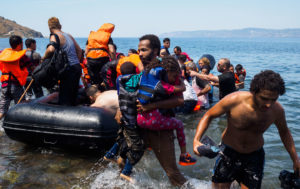By the end of July 2015, more than 124,000 refugees and migrants had arrived in Greece; an astonishing 750% increase in the amount of refugees and migrants from the same time the previous year. The vast majority of these refugees are those feeing conflict and human rights violations in Syria, Afghanistan, and Iraq in wake of the humanitarian crisis.

For these refugees, the Greek financial crisis has been both a blessing and a curse. For many, travel into the Greek islands is attractive because of the country’s reputation for leniency in immigration laws and lack of resources to adequately control its borders and the flow of immigrants. However, once they’re in, many face the bleak reality of the struggling Greek economy. Though some view Greece as simply the entry point into Western Europe with plans to move north to more prosperous countries such as Germany, many flee to Greece with very little possessions and money and can’t afford to travel any further. It’s at this point that the realities of the Greek economy and the scope of the refugee crisis come into view: Greece simply cannot support and process the major influx of refugees while at the same time trying to recover its dismal economic state. Frustrations in the wake of such considerations have reached a tipping point recently culminating in riots on the island of Lesbos over seemingly inefficient process for intake of refugees and inability of the government to provide basic necessities to those arriving on the islands.
Although Greece is struggling to assist refugees, the generous response from the Greek society, in a very difficult time, should be and appears to be acknowledged with action and support from the European Union. On September 22, the EU Interior Ministers voted in favor of a quota system to address the crisis and help to relocate asylum-seeks throughout Europe. Though the plan has been approved by the EU Interior Ministers, it still must be considered by the EU Presidents and Prime Ministers, and the EU remains divided on how best to address the refugee crisis, with some member states calling the quota system “unreasonable” and a “waste of time.” However, scholars on the other side have taken the position that the massive influx of refugees seeking employment and ready to build a new life presents a valuable opportunity for countries like Germany, with an aging workforce and declining population, and have gone as far as to forecast that a sharp increase in growth will result for those willing to accept new migrants and asylum-seekers stating, “an influx of 1 million people over the next three years would raise the country’s GDP by 0.6% by 2020.” Germany’s ability to integrate a substantial number of asylum-seeks seems to have been taken into consideration, with Germany being asked to take by far the highest number of immigrants under the proposed plan.
Demi Arenas is a 3L at the University of Denver Sturm College of Law and a Staff Editor on the Denver Journal or International Law and Policy.

